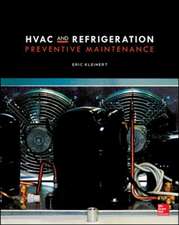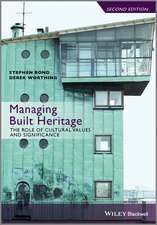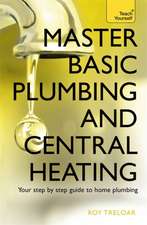Construction the Third Way
Autor John Bennetten Limba Engleză Hardback – 19 ian 2017
The resulting best practice adds to these cooperative approaches a drive for efficiency and innovation based on benchmarks of world class performance that empower teams to set themselves competitive targets. So the new approach balances cooperation and competition.
This is why Professor John Bennett's book is called ''Construction: The Third Way.'' The third way in modern politics balances the extremes of cooperation and competition in the interests of the whole community. At its best it encourages sustainable economic growth within a fair society. These aims are echoed in leading practice where teams able to balance cooperation and competition deliver better value for their customers and yet earn sustainably higher profits for construction.
The new approach requires managers to rethink construction using ideas from fundamental science that see human organizations as self-organizing networks of relationships. This throws new light on the strengths and weaknesses of both competition and cooperation, and provides the basis for a new paradigm to guide key construction decisions. The book describes this background and provides advice about organization structures that are responsive to changing markets and technologies, and construction processes that enable the industry to earch fair profits by providing customers with the levels of value and quality they now demand.
| Toate formatele și edițiile | Preț | Express |
|---|---|---|
| Paperback (1) | 259.68 lei 5-7 săpt. | |
| CRC Press – 8 mai 2000 | 259.68 lei 5-7 săpt. | |
| Hardback (1) | 764.20 lei 6-8 săpt. | |
| CRC Press – 19 ian 2017 | 764.20 lei 6-8 săpt. |
Preț: 764.20 lei
Preț vechi: 1154.58 lei
-34% Nou
Puncte Express: 1146
Preț estimativ în valută:
146.23€ • 152.99$ • 121.47£
146.23€ • 152.99$ • 121.47£
Carte tipărită la comandă
Livrare economică 03-17 aprilie
Preluare comenzi: 021 569.72.76
Specificații
ISBN-13: 9781138180390
ISBN-10: 1138180394
Pagini: 228
Dimensiuni: 189 x 246 mm
Greutate: 0.45 kg
Ediția:1
Editura: CRC Press
Colecția Routledge
ISBN-10: 1138180394
Pagini: 228
Dimensiuni: 189 x 246 mm
Greutate: 0.45 kg
Ediția:1
Editura: CRC Press
Colecția Routledge
Public țintă
Professional Practice & DevelopmentCuprins
Preface; New Paradigm; Competition; Cooperation; New Framework; Structures; Processes; References. Index.
Recenzii
HIGHLY COMMENDED IN THE CHARTERED INSTITUTE OF BUILDING'S LITERARY AWARDS MARCH 2001
"An authoritative and well researched argument and exposition for a new approach to construction, the 'Third Way': essentially a careful balance between co-operation and competition. This is not a 'how to do it' guide, but more of a treatise on the necessity and indispensibility of this new approach. The author's case for the proposition is logical, well presented and thought provoking and should be disregarded at our peril."
"An authoritative and well researched argument and exposition for a new approach to construction, the 'Third Way': essentially a careful balance between co-operation and competition. This is not a 'how to do it' guide, but more of a treatise on the necessity and indispensibility of this new approach. The author's case for the proposition is logical, well presented and thought provoking and should be disregarded at our peril."
Descriere
This book describes current best practice in managing construction. It is based on case studies of leading practice responding to demands from customers that construction match the value and quality that international competition is forcing on their own businesses. The case studies show that major customers now partner with construction firms to find more efficient ways of working.
The resulting best practice adds to these cooperative approaches a drive for efficiency and innovation based on benchmarks of world class performance that empower teams to set themselves competitive targets. So the new approach balances cooperation and competition.
This is why Professor John Bennett's book is called ''Construction: The Third Way.'' The third way in modern politics balances the extremes of cooperation and competition in the interests of the whole community. At its best it encourages sustainable economic growth within a fair society. These aims are echoed in leading practice where teams able to balance cooperation and competition deliver better value for their customers and yet earn sustainably higher profits for construction.
The new approach requires managers to rethink construction using ideas from fundamental science that see human organizations as self-organizing networks of relationships. This throws new light on the strengths and weaknesses of both competition and cooperation, and provides the basis for a new paradigm to guide key construction decisions. The book describes this background and provides advice about organization structures that are responsive to changing markets and technologies, and construction processes that enable the industry to earch fair profits by providing customers with the levels of value and quality they now demand.
The resulting best practice adds to these cooperative approaches a drive for efficiency and innovation based on benchmarks of world class performance that empower teams to set themselves competitive targets. So the new approach balances cooperation and competition.
This is why Professor John Bennett's book is called ''Construction: The Third Way.'' The third way in modern politics balances the extremes of cooperation and competition in the interests of the whole community. At its best it encourages sustainable economic growth within a fair society. These aims are echoed in leading practice where teams able to balance cooperation and competition deliver better value for their customers and yet earn sustainably higher profits for construction.
The new approach requires managers to rethink construction using ideas from fundamental science that see human organizations as self-organizing networks of relationships. This throws new light on the strengths and weaknesses of both competition and cooperation, and provides the basis for a new paradigm to guide key construction decisions. The book describes this background and provides advice about organization structures that are responsive to changing markets and technologies, and construction processes that enable the industry to earch fair profits by providing customers with the levels of value and quality they now demand.












